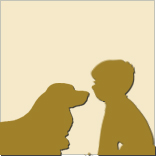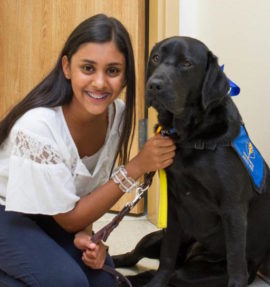Meet Mado.
For most people, the easy way out is the only way. This is true more than ever when the other
options are hard work. But for Canines for Disabled Kids scholarship recipient Madelaine
“Mado”, hard work is nothing to be scared of. A Type 1 diabetic diagnosed at 4 years
old, Mado is no stranger to adversity, either. Now a first-year psychology student at Trinity
University, she has years of practice with service dogs and as an advocate for people with
diabetes.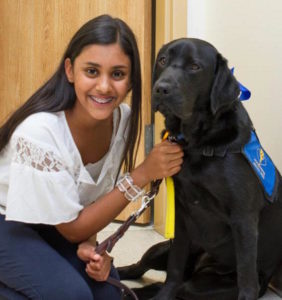
When the family got the news about Mado’s diabetes, they began looking for
ways to help her. While doing this research, they learned about Dogs4Diabetics (D4D).
They agreed that a diabetic alert dog was a great opportunity for Mado. A service dog can stay
with her at all times, and as Mado says, “It’s hard to ignore your blood sugar monitor when it’s
as cute as a service dog.” But, as with most service dog organizations, Dogs4Diabetics has age
limits. At this time, Mado was still years below the minimum age of 12. Set on being ready for
her pairing, Mado became a volunteer for Guide Dogs for the Blind (GDB) at age 9. During her
time with GDB, Mado learned a lot about service dogs, and a lot about herself. She learned that
service dogs are tools that foster independence, and she learned that she likes to help people.
These two insights formed her character a lot. Now an ambassador for Dogs4Diabetics, Mado
helps the organization spread these ideas to others.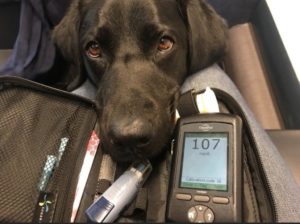
A philanthropist to say the least, Mado is always looking to help others. One
challenge that a lot of service dog users need help with is funds. Service dogs are expensive
because they are costly to train and care for. As a volunteer for GDB and D4D, Mado learned
just how heavy the financial weight of service dogs could be. So she began looking into how to
raise funds. One of the great things about the service dog industry is how willing people are to
help others. That’s exactly how Mado found Canines for Disabled Kids.
A friend from Dogs4Diabetics told Mado about Canines for Disabled Kids and its
scholarships for children seeking service dogs. Luckily for them D4D is a nonprofit
organization that does not charge a fee for the service dogs it trains. Instead, it raises money
through donations and fundraising. Even though she hadn’t met her dog yet, Mado knew that
service dogs are priceless tools for their users. She wanted to show how thankful she was. With
the scholarship that CDK awarded Mado, she supported Dogs4Diabetics.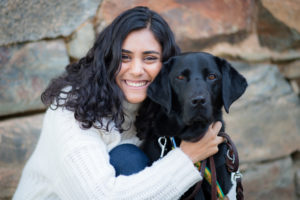
In 2015, Mado was paired with Rialta: a black Lab trained to smell and alert Mado when her
blood sugar gets low. For Mr. and Mrs. Ghufran, Rialta eased a lot of their worry for Mado. It
seems as if the pair was destined to be together. Rialta started her training with Guide Dogs for
the Blind.* But she loves children too much to meet the strict requirements of sight dogs. Sight
dogs are trained to defy their handlers to protect them from dangers they can’t see. This means
sight dogs can’t ever be distracted. Diabetic alert dogs protect their partners differently. They
use their sense of smell to protect their partners, so diabetic alert dogs don’t have to scan for
threats as sight dogs do. Rialta’s love for children only made her an even better match for Mado.
The first time the two met was during their training, and they’ve been together ever since.
Nowadays, Rialta’s work is a bit easier thanks to new tech that oversees Mado’s blood sugar
levels. But the pair are still inseparable. “I have no regrets with Rialta,” Mado said. “Getting a
service dog is 100 percent worth it and I know my life would not have been the same without
Rialta.” For other children in related situations to Mado’s, she suggests researching as much as
possible. Research brought Mado to Dogs4Diabetics, to Canines for Disabled Kids, and most
important, research brought Mado and Rialta together.
– Justin Ouellette
Justin is a Professional Communication and Journalism recent graduate of University of
Maine, Presque Isle (2020)
*Note – Puppies are not always in the right service dog school for their talents, because
of this many service dog training programs work together to assure as many pups as
possible are working in the role they are best as.
Pups-in-training transfer from one program to another, similar to college students
transferring from one college or university to another, and like those students, the pups
often flourish in their new careers.
GDB and D4D have a special relationship where pups not right for guide work are
evaluated for scent work.
Dogs4Diabetics said “ Guide Dogs for the Blind (GDB) is our largest supporter. Our
founder Mark Ruefenacht received Armstrong, our first scent-trained dog, from GDB,
and we continue to train career-changed dogs from this organization. Diabetes is the
leading cause of blindness in the US, and together with GDB, we work to help diabetics
avoid the complications of the disease.”
Canines for Disabled kids believes partnerships like this can only make the service dog
industry stronger resulting in more success stories like Mado & Rialta.
Click here for a wonderful video of Madelaine and Rialta. This video is shared by Dogs 4 Diabetics


